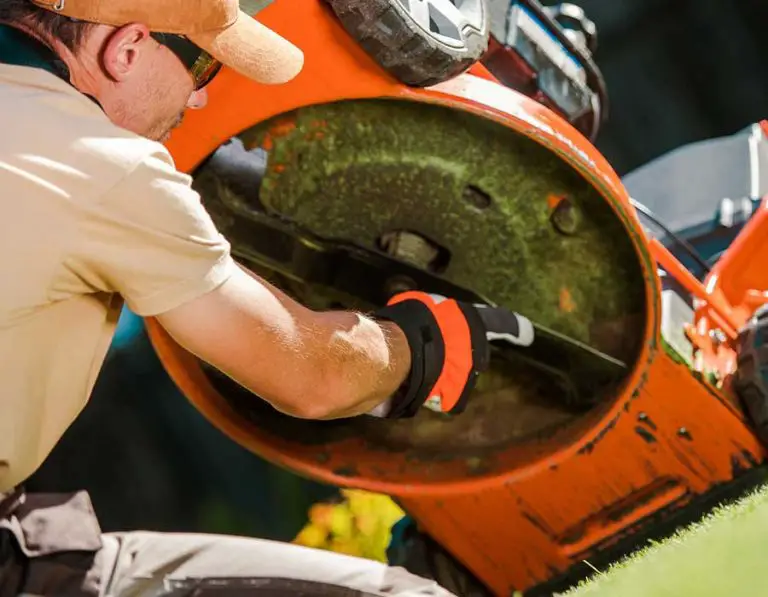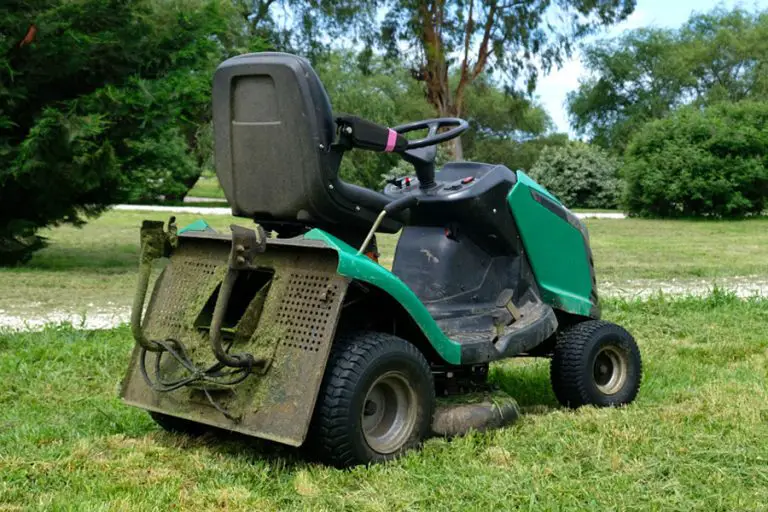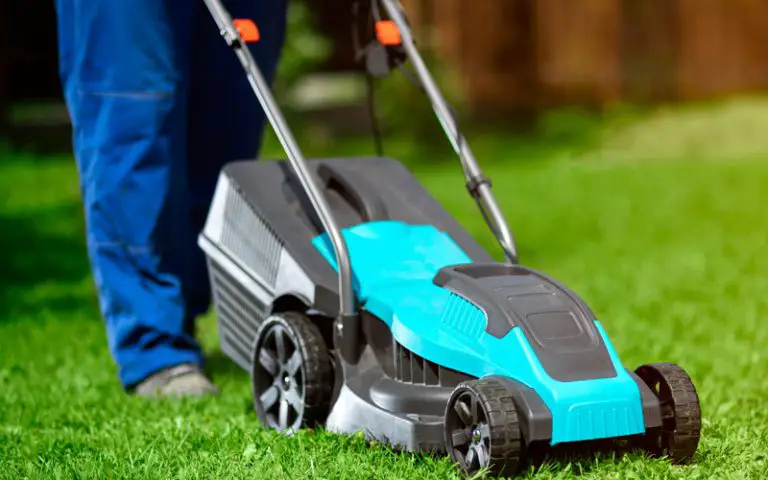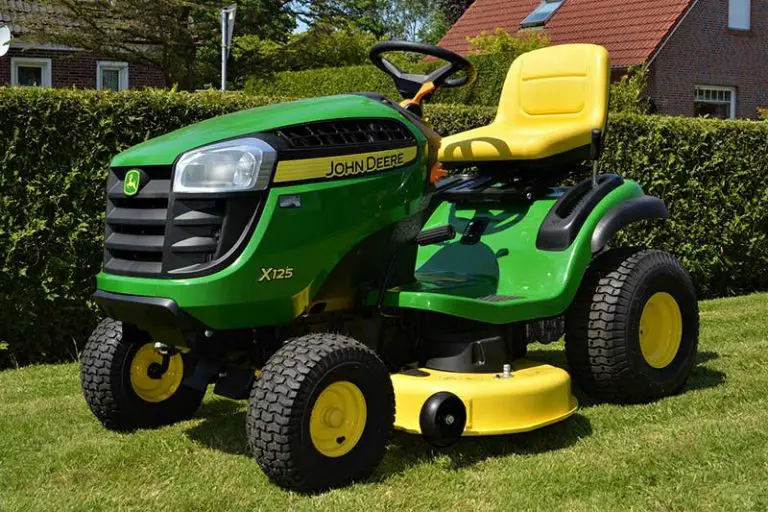Why Are Lawn Mowers So Loud? Causes & Fixes
Lawnmowers are necessary if you need to maintain a good lawn. Unfortunately, lawnmowers come with a price, especially if you stay in a serene environment – they are notoriously noisy. This limits the time you can use it if you want to be considerate about your neighbors. Many lawnmower owners have wondered if the noise that comes with it is part of the package or if there are things they can do to make the noise more palatable to the ears.
Lawnmowers are loud because of their engines, components, and how they interact with their surroundings. While gas-powered engines are noisier than electric lawnmowers, both are extremely noisy. Several issues could lead to increased noise, and identifying and fixing them can help reduce the noise created.
So Why are Lawn Mowers So Loud?
Combustion Engines
A combustion engine works by converting chemical energy into mechanical energy by creating controlled mini-explosions, and it’s loud. You may be wondering why cars, especially recent ones, aren’t as noisy as lawnmowers.
The reason is that the mufflers used in lawnmowers are essentially cheap ones. This is mainly to make sure the average person can afford to own a lawnmower. The muffler used in lawnmowers is the absorptive type of muffler. It helps with gas flow and allows the lawnmower to save gas effectively at the expense of the noise it allows.

Blades
We understand, from science, that energy is neither created nor destroyed. It’s transformed from one form to another. When surfaces interact, energy is dissipated, but the energy isn’t lost. When the motor moves the blades and causes them to turn, an amount of energy is released. Energy is also dissipated when the blades interact with the grass and cut them. In the energy system, not all the chemical energy gotten is transformed into the rotation of the blades or the cutting of the grass. Some of the energy dissipated has to escape the system, and it does so in the form of sound.
The more work the system does, the higher the amount of energy dissipated and the higher the amount of energy lost as sound in this case. This explains why the noise from lawnmowers reduces when they’re not on the grass.
Metal and Resonance
Metals are sonorous materials, and that means they resonate sound a lot. This is why modern cars aren’t as noisy as older models. Older cars were made of a lot of pure metals. Few alloy parts, if any, almost no plastic or fiber components, and on and on. Even though lawn mowers may not look it when new, lawnmowers are more or less painted metals. It’s like going around with a bell, the slightest movement on the body gets amplified, and lawnmowers vibrate a lot.
The Cooling System
Lawnmowers use fans to cool down the engine, and fans can be loud. It’s one reason why, if you’re observant, the lawnmower may sound louder as you use it. The hotter the engine is, the harder the fan works. The harder the fans work, the louder they get. One good practice is to use the lawnmower intermittently or to pause and allow it to rest for some minutes while using it. It doesn’t only protect your lawnmower from overheating but also reduces the noise, even if it’s negligible.
The Engine
You know how you treat your car well, have it serviced and check the oil regularly, check the O2 sensors, use the suitable gas, and ensure that its engine functions optimally. You should do the same thing with your lawnmower. A bad engine means ineffective gas to air ratio, it means bad combustion, it means overheating, it means increased work, and it means increased noise.
While this isn’t a reason why good lawnmowers tend to be loud, it accounts for why many lawnmowers make a lot of noise. A lot of owners don’t take care of their engines well.
Reasons Why a Lawn Mower May Be Louder Than Normal and What to Do
Now that we’ve established why lawnmowers are a loud appliance, it’s time to discuss reasons why your lawnmower may be louder than it should be:
Clogging
Over time, your lawnmower will get clogged in several places with either grass or debris. It’s only a question of when. Check your lawnmower blades regularly (when they’re switched off, of course!) and remove any debris. Some folks say to do so after each usage. Check the cooling fan for debris. If possible, check the engine compartments too.
When any part of the lawnmower is clogged, the engine has to work harder to overcome the friction caused by the clogging. That means more noise.
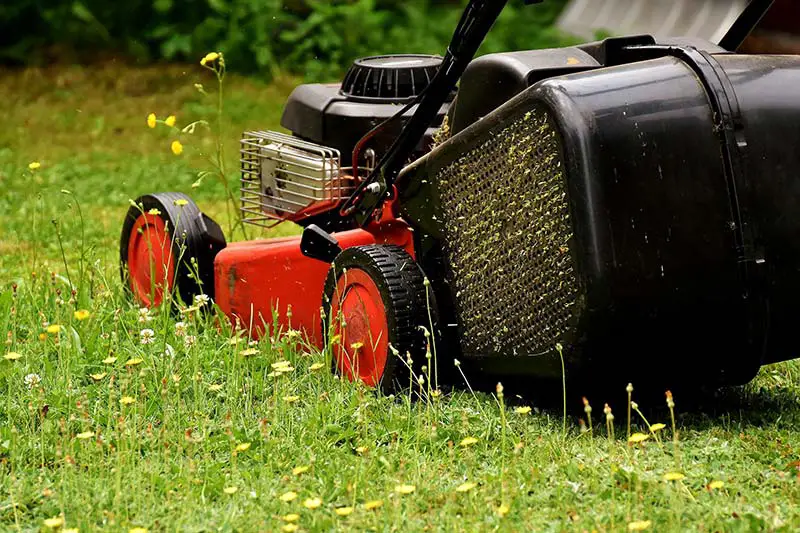
Heat
As explained earlier, a hotter engine would trigger increased work by the cooling system, ultimately leading to more noise. A hotter engine doesn’t always mean an overworked engine; the weather also plays a part. Working at times of the day when the weather is cooler is an excellent way to make sure your lawnmower stays as cool as possible, reducing the noise
As a fact, sound travels faster with increased heat. While this may not favor the user, it would reduce the intensity of the noise your neighbors hear, even if it’s just a little bit when you target lower temperatures to mow your lawn with your lawnmower.
Bad Oil
Bad Oil could result from many things, but the most common reason is negligence on the owner’s part. Check the oil of your lawnmower regularly. Instead of only topping the oil every time it runs low, you can as well change the oil when it’s due. This means when the oil has lost most of its viscosity and color (when it’s become darkened). Bad oil means the engine has to work harder. It also increases friction within the engine, translating to more noise.
As simple as checking the oil of your lawnmower every time you use it could significantly reduce the noise an already noisy machine like the lawnmower makes.
Curved Blades
The lawnmower blades are usually bent and should remain bent at a certain angle. With time, that angle may deviate such that the blades begin touching the inner part of their casing. This creates extra noise.
The solution is as simple as using a hammer to get it back into shape. But, before doing this, be sure you know exactly what you’re doing. Blades can be sharp for one, and you could damage the blades if you do this wrongly. Seek professional help if you feel you aren’t up to the task.
Loose Fittings
Several parts of the lawnmower may become loose with time. The blades may not be properly fastened, the belt may have become slack, and some bolts may have become loose. This means increased vibrations (alongside potential risks). If you notice that your lawnmower sounds oddly louder than it used to, or you hear a rattling sound coupled with increased vibrations, it may be a sign that some bolts and nuts are sitting loosely.
If you’re technically inclined, this shouldn’t be a problem. Take it upon yourself to loosen and reassemble your lawnmower parts, taking special attention to fasten bolts, screws, and loose nuts.
Fixing The Noise
Although you’ve tried your best to keep the lawnmower noise to as little as possible, that isn’t enough. There’s an option of getting a different muffler.
The type of muffler lawnmowers use is the absorptive muffler, which allows gas flow, saves fuel, and is appropriate for getting the power your lawnmower needs. But, if you don’t mind the financial cost, a different muffler would see that the noise from your lawnmower reduces drastically.
A reflective muffler is the choice of most lawn mower owners who want to deal with their machine’s noise. It works using destructive interference to cancel out the noise created. It’s like creating a wave to meet an incoming wave so that both get disrupted when they clash.
Final thoughts
Due to the engine design and the body parts of lawnmowers, they tend to be quite noisy (both electrical and gas-powered lawnmowers). Nonetheless, several things could cause lawnmowers to sound louder than they should. With good usage and proper inspection, the noise created can be brought to a bare minimum. Habits like removing grass or debris clogging up spaces, changing the oil regularly, keeping the lawnmower’s engine as cool as possible, and periodically servicing your lawnmower would ensure that the noise produced is reduced to the bare minimum.
Also, if you’re up to the task, consider changing the muffler that was used. A reflective muffler tends to reduce the noise produced quite significantly.

